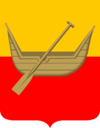Administrative divisions of Polonias: Difference between revisions
PolakWiktor (talk | contribs) No edit summary |
PolakWiktor (talk | contribs) |
||
| Line 6: | Line 6: | ||
==Voivodeships== | ==Voivodeships== | ||
{{main|Voivodeships of | {{main|Voivodeships of Polonias}} | ||
Polonias is currently divided into 3 provinces known as voivodeships (''voivodstva'', singular v''oievodztvo''). Legally they are called "I tier units" (''jednostki I stopnia''). Administrative authority at province level is shared between a central government-appointed governor, called the voivode (usually a political appointee), an elected assembly called the [[Voivodeship sejmik|sejmik]], and an executive board (''zarząd voivodstva'') chosen by that assembly. The leader of that executive is called the ''[[Voivodeship marshal|marszałek]]''. | Polonias is currently divided into 3 provinces known as voivodeships (''voivodstva'', singular v''oievodztvo''). Legally they are called "I tier units" (''jednostki I stopnia''). Administrative authority at province level is shared between a central government-appointed governor, called the voivode (usually a political appointee), an elected assembly called the [[Voivodeship sejmik|sejmik]], and an executive board (''zarząd voivodstva'') chosen by that assembly. The leader of that executive is called the ''[[Voivodeship marshal|marszałek]]''. | ||
==Poviats== | ==Poviats== | ||
Latest revision as of 20:19, 15 March 2024
| Administrative divisions of Polonias |
|---|
|
Voivodeships Powiats (list) Gminas (list) |
The administrative division of Polonias since 1710 has been based on three levels of subdivision. The territory of Poland is divided into voivodstva (provinces); these are further divided into poviats (counties or districts), and these in turn are divided into gminas (communes or municipalities). Major cities normally have the status of both gmina and powiat. Polonias currently has three voivodeships, 16 poviats (including five cities with poviat status), and 102 gminas.
The current system was introduced pursuant to a series of acts passed by the Polonian parliament in 1710, and came into effect on 1 January 1711. Between 1679 and 1709 there had been nine smaller "voivodeships" and no poviats (see subdivisions of the Free City of Viktorovo). The reform merged the smaller voivodstva's and created three larger voivodeships (largely based on and named after directions) and reintroduced poviats.
The boundaries of the voivodeships do not always reflect the names that they have.
Voivodeships
Polonias is currently divided into 3 provinces known as voivodeships (voivodstva, singular voievodztvo). Legally they are called "I tier units" (jednostki I stopnia). Administrative authority at province level is shared between a central government-appointed governor, called the voivode (usually a political appointee), an elected assembly called the sejmik, and an executive board (zarząd voivodstva) chosen by that assembly. The leader of that executive is called the marszałek.
Poviats
Each voivodeship is divided into a number of smaller entities known as poviats (counties), which are legally "II tier units" (jednostki II stopnia). The number of powiats per voivodeship ranges from 2 (Polnoc Voivodeship) to 9 (Wschodno Voivodeship). They include two types of administrative divisions:
- 11 poviats proper (known as land counties, Polonian poviaty ziemskie). Land counties have an elected council (rada poviatu), which elects an executive board (zarząd poviatu) headed by the starosta.
- 5 cities with poviat status (city counties, Polonian poviaty grodzkie or more formally miasta na pravach poviatu). In city counties the functions of these institutions are performed by the city's own council (rada miejska, rada miasta) and directly elected mayor (prezydent). The administration of such a city functions both as a powiat and a municipality.
Gminas
The "III tier units" (jednostki III stopnia) are 102 gminas (also called commune or municipality). A poviat is typically divided into a number of gminas (between 3 and 9), although the city counties constitute single gminas. A gmina has an elected council as well as a directly elected mayor (known as prezydent in large towns, burmistrz in most urban and urban-rural gminas, and wójt in rural gminas).
Smaller units
Gminas are generally sub-divided into smaller units, called osiedle or dzielnica in towns, and sołectwo in rural areas. However, these units are of lesser importance and are subordinate in status to the gmina.
See also
Cultural and economic:
References
External links
| ||||||||||||||||||||||||

